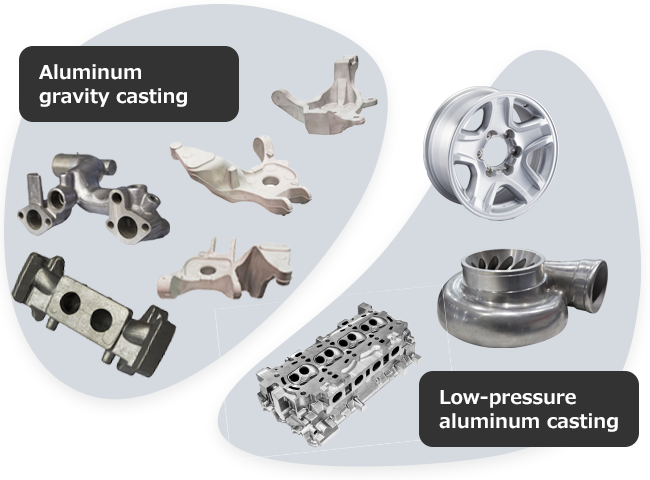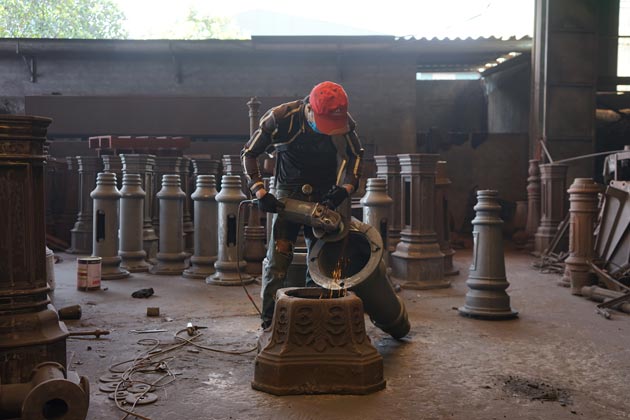Comprehending the Conveniences and Innovations in the Aluminum Foundry Industry
The Aluminum Foundry industry plays a vital role in modern manufacturing. Its light-weight residential or commercial properties notably improve gas performance, specifically in aerospace and vehicle markets. In enhancement, Aluminum's resistance to rust warranties long life in numerous applications. As the market advances, innovations such as advanced recycling and additive manufacturing are improving manufacturing approaches. Discovering these innovations exposes not just the benefits however also the obstacles ahead for Aluminum factories in a quickly changing market.
The Lightweight Advantage of Aluminum
Aluminum's lightweight nature supplies considerable benefits across various industries, especially in production and transport. Its low density permits the manufacturing of elements that are much easier to mount and handle, resulting in minimized labor costs and boosted effectiveness. In the auto sector, lighter automobiles add to enhanced fuel economic climate and lower discharges, straightening with worldwide sustainability goals. Similarly, in aerospace, making use of Aluminum lowers the total weight of aircraft, which is crucial for enhancing efficiency and minimizing operational expenses.
Furthermore, Aluminum's light-weight residential or commercial properties assist in cutting-edge styles that were previously impossible with much heavier materials. This versatility enables manufacturers to create complicated shapes and structures while keeping structural stability. On the whole, the light-weight benefit of Aluminum not just improves product performance yet also drives developments in innovation and style, making it a favored product in different applications.
Rust Resistance and Resilience
The Aluminum Foundry industry is renowned for producing materials with remarkable corrosion resistance, making them excellent for numerous applications. This residential property, integrated with enhanced structural integrity, adds to the lasting performance advantages that Aluminum elements provide. Consequently, industries increasingly count on Aluminum to meet requiring environmental conditions without endangering top quality.
Superior Corrosion Resistance
While various metals face significant obstacles from environmental elements, Aluminum sticks out for its exceptional rust resistance, making it a recommended option in several applications. This residential property is largely because of an all-natural oxide layer that forms on the Aluminum surface area, offering a barrier versus wetness and corrosive agents. Unlike other steels that may corrosion or deteriorate gradually, Aluminum keeps its stability even in rough environments, such as coastal locations or commercial settings. Furthermore, its lightweight nature combined with rust resistance makes it ideal for applications in aerospace, automotive, and aquatic industries. Generally, Aluminum's outstanding longevity not just improves item durability however likewise reduces upkeep prices, providing a compelling benefit for customers and suppliers alike.
Enhanced Structural Honesty
Designers and engineers increasingly identify the relevance of enhanced structural integrity in contemporary applications, where both rust resistance and resilience are critical. Aluminum alloys, understood for their light-weight residential properties, also display extraordinary resistance to rust, making them appropriate for harsh settings. The innovative methods employed in the Aluminum Foundry market add considerably to generating parts with enhanced durability. Advanced casting processes and alloy structures are tailored to meet specific efficiency needs, making sure that frameworks can hold up against extreme conditions without compromising stability. Moreover, surface area therapies and coatings enhance the lifespan of Aluminum products, even more minimizing wear and tear in time. This focus on boosted structural stability not only prolongs the use of materials however also decreases maintenance expenses, solidifying Aluminum's setting as a material of selection in different markets.
Resilient Efficiency Conveniences
Durable performance in Aluminum elements is mainly connected to their remarkable rust resistance and sturdiness. Unlike numerous steels, Aluminum normally forms a protective oxide layer, which prevents rust and deterioration in numerous environments, including industrial and marine setups. This intrinsic residential or commercial property substantially prolongs the life expectancy of Aluminum products, minimizing maintenance and replacement prices. Furthermore, the lightweight nature of Aluminum improves its applicability across industries without compromising stamina. The product's resistance to damage additionally adds to its dependability in requiring applications, making it an excellent option for automotive, aerospace, and building and construction industries. As markets progressively focus on sustainability and durability, Aluminum's performance benefits align with contemporary design requirements, solidifying its role in ingenious production procedures.
Ecological Impact and Sustainability
 As the Aluminum Foundry market develops, it progressively prioritizes ecological impact and sustainability, acknowledging the demand for accountable practices in the face of environment modification. Initiatives to lessen waste and power usage are at the leading edge, with many shops taking on reusing campaigns to recover Aluminum scrap. This not only decreases basic material use but likewise notably lowers power expense, as recycled Aluminum requires only a fraction of the energy compared to main manufacturing.
As the Aluminum Foundry market develops, it progressively prioritizes ecological impact and sustainability, acknowledging the demand for accountable practices in the face of environment modification. Initiatives to lessen waste and power usage are at the leading edge, with many shops taking on reusing campaigns to recover Aluminum scrap. This not only decreases basic material use but likewise notably lowers power expense, as recycled Aluminum requires only a fraction of the energy compared to main manufacturing.Advancements in emissions control innovations are being executed to reduce air contaminants, lining up operations with stricter environmental policies. Factories are likewise exploring alternative energy sources, such as solar and wind, to power their centers sustainably. By cultivating cooperation with stakeholders, the sector intends to establish innovative solutions that enhance ecological stewardship. Jointly, these initiatives highlight a commitment to reducing the Aluminum Foundry's carbon impact while advertising a circular economic climate within the manufacturing market.
Advanced Manufacturing Techniques
 Changing manufacturing processes, the Aluminum Foundry sector is significantly incorporating sophisticated look here manufacturing techniques to improve effectiveness and accuracy. Methods such as computer system numerical control (CNC) machining and additive production have actually become vital parts in optimizing manufacturing operations. CNC machining permits high-precision element manufacture, considerably minimizing product waste and manufacturing time. Meanwhile, additive production opens up brand-new avenues for complicated geometries and light-weight designs that were formerly difficult to achieve.
Changing manufacturing processes, the Aluminum Foundry sector is significantly incorporating sophisticated look here manufacturing techniques to improve effectiveness and accuracy. Methods such as computer system numerical control (CNC) machining and additive production have actually become vital parts in optimizing manufacturing operations. CNC machining permits high-precision element manufacture, considerably minimizing product waste and manufacturing time. Meanwhile, additive production opens up brand-new avenues for complicated geometries and light-weight designs that were formerly difficult to achieve.In addition, the implementation of automation and robotics in Aluminum foundries enhances procedures, minimizes human mistake, and boosts worker safety and security. These technologies facilitate a more responsive manufacturing environment, enabling producers to adapt quickly to market view it now needs. The combination of innovative simulation software program additionally enhances the layout and screening stages, causing exceptional product top quality. Collectively, these methods not only boost functional performance but additionally foster development, positioning the Aluminum Foundry market at the center of modern-day production.
Developments in Reusing Processes
The Aluminum Foundry market is not only advancing in making methods but is likewise making substantial strides in recycling processes. Developments are arising to boost the performance of recycling methods, minimizing energy consumption and boosting sustainability. Advanced sorting modern technologies, such as computerized optical sorting, enable the identification and separation of Aluminum from other materials with high precision. This brings about a better of recycled Aluminum, which is important for preserving the honesty of the end products.
Closed-loop recycling systems are being implemented, enabling producers to recycle Aluminum scrap within their very own manufacturing procedures. This decreases waste and advertises a round economic situation. In addition, research into new recycling methods, such as hydrometallurgical processes, supplies the potential for recovering Aluminum from complicated waste streams. These developments not just contribute to lowering the carbon footprint of the Aluminum Foundry market yet additionally boost its economic stability in an increasingly ecologically conscious market.
Applications Across Different Industries
Many industries are progressively recognizing the versatility and benefits of Aluminum Foundry products, leading to extensive applications across fields such as automotive, consumer, building and construction, and aerospace goods. In the automotive industry, Aluminum castings add to light-weight lorry layouts, enhancing fuel effectiveness and performance. Aerospace manufacturers use Aluminum components for their strength-to-weight ratio, essential for aircraft frameworks and components.
In building and construction, Aluminum is favored for its resilience and resistance to rust, making it suitable for window frames, roof, and structural assistances. Consumer goods likewise take advantage of Aluminum Foundry items, as seen in kitchenware, electronic devices, and packaging, where lightweight and recyclable products are essential.
The flexibility of Aluminum Foundry techniques permits detailed designs and specific read this specs, dealing with the varied needs of these industries. Therefore, Aluminum Foundry items are coming to be important to modern production processes across numerous industries.
Future Fads in Aluminum Foundries
As markets continue to evolve, Aluminum foundries are positioned to accept numerous vital patterns that promise to enhance efficiency and sustainability. One popular trend is the boosting adoption of digital modern technologies, including automation and expert system, which improve procedures and improve high quality control. Furthermore, the push towards sustainable techniques is leading factories to purchase reusing innovations, significantly minimizing waste and energy consumption.
 One more arising trend is using advanced alloys and products, catering to the growing need for light-weight and resilient parts throughout various sectors (Aluminum Foundry). The combination of additive production strategies is prepared for to change part design, providing modification and minimizing lead times.
One more arising trend is using advanced alloys and products, catering to the growing need for light-weight and resilient parts throughout various sectors (Aluminum Foundry). The combination of additive production strategies is prepared for to change part design, providing modification and minimizing lead times.Partnership with research organizations is additionally expected to drive advancement, as factories look for to develop new procedures and products. Aluminum Foundry. Jointly, these fads show a transformative future for the Aluminum Foundry industry, lining up with more comprehensive goals of sustainability and effectiveness
Frequently Asked Questions
What Are the Typical Costs Linked With Aluminum Foundry Production?
The normal costs related to Aluminum Foundry manufacturing consist of raw materials, labor, energy, devices maintenance, and overhead expenses. These factors jointly influence the general economic investment needed for reliable Aluminum casting procedures.
Exactly How Does Aluminum Contrast to Various Other Steels in Toughness?
Aluminum, while lighter than lots of steels, displays excellent strength-to-weight ratios. Compared to steel, Aluminum is much less strong yet provides outstanding deterioration resistance, making it a beneficial choice in applications where weight and longevity are essential.
What Precaution Are in Location in Aluminum Foundries?
Security procedures in Aluminum factories commonly consist of compulsory personal protective tools, air flow systems to manage fumes, routine tools maintenance, training programs for staff members, and adherence to rigorous safety policies to reduce threats connected with liquified steel handling.
How Is Quality Assurance Managed in Aluminum Casting Processes?
Quality control in Aluminum casting processes involves rigorous examinations at different stages, consisting of basic material analysis, process surveillance, and final item testing. Methods such as statistical process control and non-destructive testing assurance adherence to market requirements.
What Accreditations Are Important for Aluminum Foundry Suppliers?
The value of qualifications for Aluminum Foundry vendors consists of ISO 9001 for quality monitoring, ISO 14001 for environmental administration, and industry-specific criteria like ASTM and SAE, making certain compliance, safety, and dependability in making procedures.
The Aluminum Foundry industry plays an important role in contemporary production. The Aluminum Foundry sector is renowned for producing materials with exceptional rust resistance, making them excellent for various applications. Changing manufacturing procedures, the Aluminum Foundry sector is significantly integrating sophisticated production strategies to enhance performance and precision. The Aluminum Foundry sector is not only progressing in manufacturing techniques however is additionally making considerable strides in recycling procedures. As sectors proceed to develop, Aluminum factories are poised to welcome a number of vital trends that promise to enhance effectiveness and sustainability.